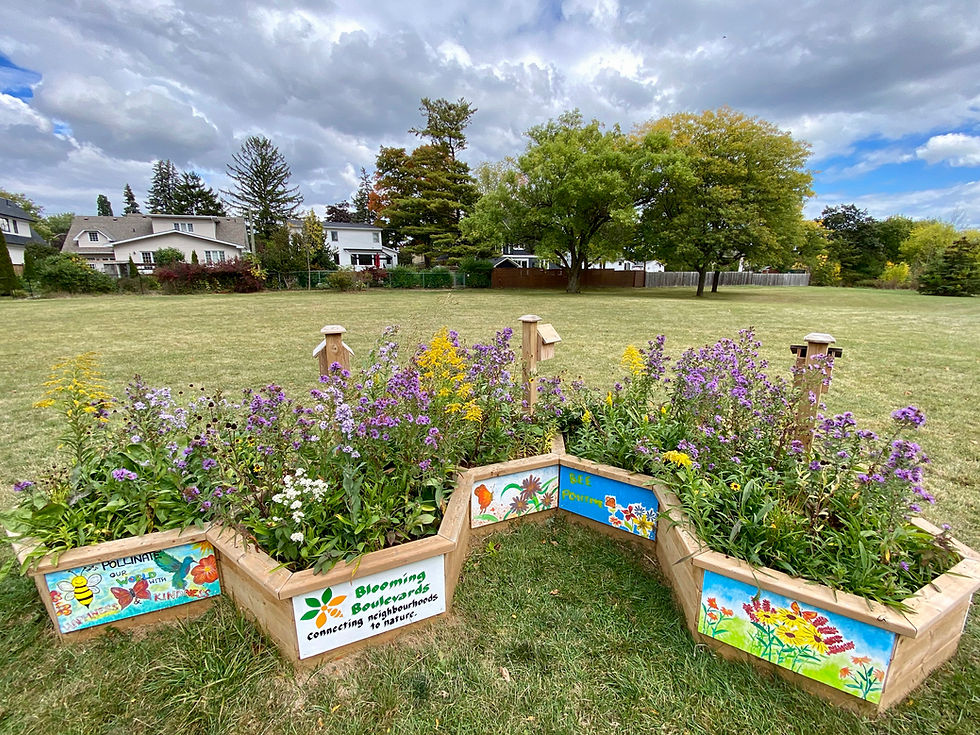How to Maintain Your Garden with the Environment in Mind
- Jeanne McRight

- Jun 29, 2023
- 3 min read
Updated: Sep 5, 2023
By Pamela Sleightholm
We know that gardening is satisfying and rewarding – watching the little plants you cared for grow and thrive is such a joy. However, there are several steps that we can take as gardeners to ensure that we’re benefitting the environment and our ecosystem, rather than being harmful.
1. Choose native plants
Of course we’re going to start with this! Native plants preserve biodiversity while contributing to the ecosystem – they’re an essential food source for many species, including native pollinators. Native plants are better adapted to the climate, soil and rainfall of your area, which means they need less maintenance and watering, and they’re more resistant to pests and disease. And they're beautiful! With a little planning you can have native plants blooming in every season for a mix of colours, textures and scents.
Master Gardener Mohan Iyer wrote this great piece called "Why Native Plants Matter" that goes into more detail about the impact native plants can have.
2. Be careful if using fertilizers
If you feel that your soil lacks fertility and nutrients do not meet plant needs, get your soil tested. Apply fertilizer type and amount according to the results of the soil test. An imbalance of synthetic fertilizers can harm plants and soil biota, and pollute waterways. Keep in mind that native plants are adapted to local soils and do not need fertilizer. Instead, we recommend benefiting plants by feeding the soil fungi and improving soil structure with organic amendments like compost, worm castings, rotted leaves, and/or manure.
Want more information about soil nutrients for native plants, fungi and other micro-organisms? Check out Nutrients for Natives created by BB president Jeanne McRight.

3. Water wisely
Wasteful watering can be detrimental to the environment. Many native plants have deep roots that reach down to absorb water from the ground – many species are drought tolerant and don’t need a lot of extra water.
If you’re watering to establish native plants, or to grow a veggie garden, consider using methods that are water-efficient. You can connect rain barrels to downspouts to harvest rainwater for the garden - this has the added benefit of reducing the amount of water going into wastewater systems during heavy rain. Even a drip irrigation system or drip hose can greatly reduce the amount of water you’re using.
Planning when to water is just as important as how to water. Watering in the morning or evening will reduce the amount of water that’s evaporated by the hot sun. And there’s no need to water during a rainstorm! If you depend on timers for your irrigation system, there are now smart controls that can detect rain and adjust the watering schedule as needed.
4. Pest management
If something is eating your plants, it means your plants are part of an ecosystem! That said, there are some “pests” that we’d like to see less of in our gardens. Fortunately, native plants attract a diversity of insects, including those that repel (or eat) harmful pests. These predatory insects have an important role to play in garden pest control. If you see aphids on one of your plants, just wait a few days for the ladybugs to arrive!

Commercial pesticides pollute our soil and water, and can harm the very insects that we’re trying to support.
5. Compost
Here in Mississauga we have a municipal compost system that collects from houses throughout the city every week. But if you have the space, consider a home composter.
Composting at home reduces the amount of fuel used to truck our waste around, and gives you an incredibly rich soil amendment that’s ready when you need it. Master Gardener Diana Westland wrote a blog post "Backyard Gardens; Recycle that Refuse!" to get you started, you can find it here.
If you’re in an apartment, see if there’s a community compost program in your area. Some neighbourhoods have local collections with compost going to community gardens in the area.
6. Control weeds naturally
Like synthetic fertilizers and pesticides, chemical herbicides can damage the soil and pollute water. There are several natural methods that you can use to keep weeds at bay, without harming the environment.
For small areas, hand pulling and using natural weed killers like vinegar or boiling water can help. Mulching around your plants can prevent weeds from ever setting seed – just be sure to leave some bare soil for native bees to dig their nests.
Finally, get to know which weeds are truly harmful – invasive species that can harm the ecosystem like garlic mustard, goutweed and periwinkle should be put under control quickly. Check out the Invasive Species Centre’s website for more information about invasives.
Whether you adopt one or all of these practices this year, know that you’re creating a more ecologically sound garden that will benefit your community, your garden and our ecosystem!
















Comments